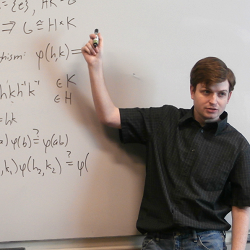Adam D. Groce
Assistant Professor of Computer Science
Department of Mathematics, Reed College
I am interested in all aspects of theoretical computer science, but my training and research focuses on cryptography and related fields.
One focus of my research is database privacy, particularly differential privacy and related definitions. The goal of this field is to allow the analysis of databases even when they contain data about individuals whose privacy must be protected. The huge databases maintained by governments, corporations, and academia (among others) have the potential to teach us a huge amount about the world around us, but privacy concerns often get in the way of this learning. Database privacy research seeks to remove this obstacle, allowing the analysis to occur while simultaneously protecting privacy.
In particular, I am currently focused on how to carry out hypothesis tests while maintaining differential privacy. The goal here is to create practical, usable tests with concrete measures of statistical power. Hypothesis tests have traditionally not been a focus of computer scientists, so they haven't received the attention they deserve, but they are the workhorse of scientific research in many fields. This work is in collaboration with Andrew Bray and Anna Ritz and is supported by an NSF grant.
I am also interested in rational cryptography, the intersection between cryptography and game theory. Traditionally, cryptography has required protocols to be secure against "malicious" adversaries, meaning adversaries that will do anything possible to cause harm. Rational cryptography instead models adversaries as rational actors with understandable goals. This makes adversaries more predictable and allows us to acheive things that are impossible against malicious adversaries.
I am always happy to involve students in my research. If you are a Reed student interested in doing research on the topics above, I'd be happy to talk to you.
Papers
*Astersisks denote an undergraduate author. You can also find a list of senior theses that I've advised here.
"Connectivity Measures for Signaling Pathway Topologies," with Nicholas Franzese*, T. M. Murali, and Anna Ritz. PLOS Computational Biology. Also appeared in GLBIO, listed below [PDF]
"Oracle Separations between Quantum and Non-interactive Zero-knowledge Classes," with Benjamin Morrison*. to appear in Information Processing Letters. [PDF]
"Differentially Private Nonparametric Hypothesis Testing," with Simon Couch*, Zeki Kazan*, Kaiyan Shi*, and Andrew Bray. ACM Conference on Computer and Communications Security (CCS), November 2019. [PDF, Code]
"Cheaper Private Set Intersection via Differentially Private Leakage," with with Peter Rindal and Mike Rosulek. Privacy Enhancing Technologies Symposium (PETS), July 2019. [PDF]
"Improved Differentially Private Analysis of Variance," with Ira Globus-Harris*, Iris Griffith*, Marika Swanberg*, Anna Ritz, and Andrew Bray. Privacy Enhancing Technologies Symposium (PETS), July 2019. [PDF]
"Hypergraph-Based Connectivity of Signaling Pathway Topologies," with Nicholas Franzese*, T. M. Murali, and Anna Ritz. Great Lakes Bioinformatics Conference (GLBIO), May 2019. [PDF]
"Differentially Private ANOVA Testing," with Zachary Campbell*, Andrew Bray, and Anna Ritz. International Conference on Data Intelligence and Security (ICDIS), April 2018. [PDF]
"Externally Verifiable Oblivious RAM," with Joshua Gancher* and Alex Ledger*. Privacy Enhancing Technologies Symposium (PETS), July 2017. [PDF]
"CompGC: Efficient Offline/Online Semi-honest Two-party Computation," with Alex Ledger*, Alex Malozemoff, and Arkady Yerukhimovich. [PDF, Code]
"Fair Computation with Rational Players," with Amos Beimel, Jonathan Katz, and Ilan Orlov. [PDF]
"New Notions and Mechanisms for Statistical Privacy," PhD thesis, University of Maryland, advised by Jonathan Katz, 2014.
"Coupled-worlds Privacy: Exploiting Adversarial Uncertainty in Statistical Data Privacy," with Raef Bassily, Jonathan Katz, and Adam Smith. Symposium on Foundations of Computer Science (FOCS), October 2013. [PDF, conference version]
"Byzantine Agreement with a Rational Adversary," with Jonathan Katz, Aishwarya Thiruvengadam, and Vassilis Zikas. International Colloquium on Automata, Languages and Programming (ICALP), July 2012. [PDF]
"Fair Computation with Rational Players," with Jonathan Katz. Eurocrypt, April 2012. [PDF]
"Limits of Computational Differential Privacy in the Client/Server Setting," with Jonathan Katz and Arkady Yerukhimovich. Theory of Cryptography Conference (TCC), March 2011. [PDF]
"A New Framework for Efficient Password-Based Authenticated Key Exchange," with Jonathan Katz. ACM Conference on Computer and Communications Security (CCS), October 2010. [PDF]
